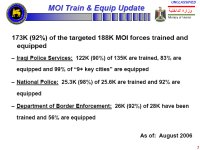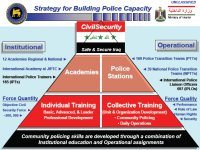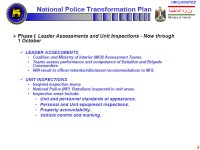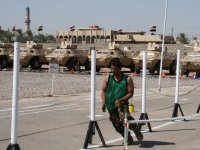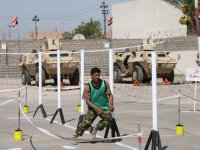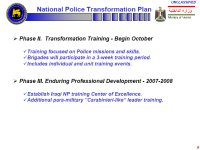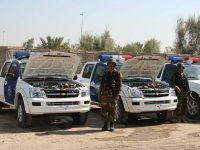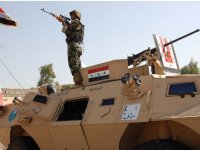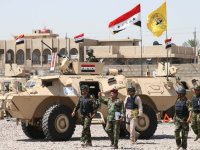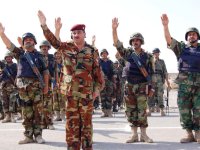
Press Briefing, Aug. 14, 2006
Multi-National Force-Iraq
Monday, 14 August 2006
IRAQ OPERATIONAL UPDATE BRIEFING BRIEFERS: MAJOR GENERAL WILLIAM B. CALDWELL IV USA, SPOKESMAN, MULTI-NATIONAL FORCE - IRAQ; AND MAJOR GENERAL JOE PETERSON, COMMANDER, CIVILIAN POLICE ASSISTANT TRAINING TEAM LOCATION: COMBINED PRESS INFORMATION CENTER, BAGHDAD, IRAQ TIME: 9:00 A.M. EDT DATE: MONDAY, AUGUST 14, 2006
GEN. CALDWELL: Good afternoon, ladies and gentlemen. Today, we're fortunate to have with us Major General Joe Peterson, the commander of the Civilian Police Assistant Training Team. He's going to discuss with us today some of the vital elements of Iraqi police and national police forces. He will also address not only the police training and equipping, but the building of police capacity and capability.
Before we start, I'd like to address one thing that's been playing in the news just recently. Last night, there was a very unfortunate explosion and series of explosions that occurred on the Karrada peninsula at the Zaafaraniyah district. We have just in the last hour and a half got back our first explosive ordnance disposal team's assessment of what occurred at this site, based on the fact that there was one significant explosion that was reported and then some smaller ones.
Based on the information they have at this point, they're coming back saying that it was an internal gas explosion, and it created the first significant explosion occurring on the first floor of that building -- which I think most people have probably seen at this point, though we can provide more information later on it -- that then created what they think were additional, as they say, multiple secondary-blast seats and damage outside of that building.
Further investigation is ongoing. I know there's multiple reporting saying that it was everything from car bombs to vehicle explosion, some other things. But everything right now that we have that's available to us from the explosive ordnance detachment that has been operating in that area points to the fact that it was a(n) internal gas explosion that set off a series of other explosions at that location. The specifics about what's occurring there right now, I know General Peterson can talk, as the Iraqi national police immediately responded and have up to a battalion of national police operating in that area, with now assistance from coalition forces providing some additional heavy equipment.
I'd also like to briefly describe some of the activities that are going on in Baghdad, having had the opportunity this week to spend some time in the Dura district, where I think most of you all know we have a lot of activities going on. Down there, I had the opportunity to talk with some Iraqi citizens in the beladiya as well as the Iraqi national police, our own forces from both the 4th Brigade Combat Team of the 4th Infantry Division and the 172nd Stryker Brigade that were there in the area.
To paraphrase our colleagues here in the Iraqi Ministry of Defense, it serves little purpose to ask when this part of Amaliya Ma'an ila Al-Amam or Operation Together Forward began, what phase we are in or when it will end. As they said, quote, "Working the counterterrorism is constant. The plan will end when the security is achieved, and the real intent of the plan is reached in the achieving of security in capital and restoring services, economic opportunities and hope to the Baghdad residents."
As we've stated before, this plan is an evolution. The solutions for Baghdad must be long term. Abating the extremists in the capital will neither be easy nor rapid. Challenges will ensue, but efforts will march forward block by block, mahala by mahala, beladiya by beladiya. Throughout Baghdad, there are both simultaneous and sequential activities occurring -- a combination of both the kinetic and the economic, the military and the civic, the Iraqi and the coalition forces all working together.
What matters in the end is not the litany of statistics that you will hear. We can easily site over 3,000 buildings have already cleared, over 20 suspects have been detained, over 50 weapons have been seized, over eight cars have been seized, and over 330 weapons have been registered. What really matters is the number of businesses that reopened and will remain open; the refurbished stalls section by section in the marketplace there. The drainage has improved. The rubbish is removed. And of course, like we'd all like to see, the number of children that you see during their summer break out riding their bikes and playing in the streets.
I was asked last Wednesday about the abilities of the Iraqi security forces to conduct cordon-and-search operations, during the press conference. I had the opportunity to talk to a lot of the young American coalition force members out there when was there, and I asked that very same question to them. I was immediately informed Iraqis are inherently better at search operations than coalition forces. They know what to look for. They have a sense when something is askew, based not only on their training and experience but based on their innate knowledge of the language and the people. With the ability to detecting slightest difference in the dialect, they may be able to pick up a suspect, who may not be from that area, that an American or coalition force would not be able to do.
Iraqi army and police personnel understand the hierarchy of Iraqi family relations, the interaction with neighbors, male versus female attitudes, and all the likeliest places that perhaps one would stash weapons or something else that is illegal.
No doubt, with half the Iraqi army division headquarters in the lead and with two national police battalions there, too, we have much of the road still ahead of us. There is much more to do as Iraqi forces move forward.
One of our soldiers noted what he finds encouraging is not only how well the Iraqi security forces are able to execute cordon-and- search operations, but more importantly, as he told me, the initiative he sees. That is at the heart of all the current operations here in Baghdad -- initiative, initiative -- protect the capital, to build the economy and to shape the future here for the people who live in Baghdad.
We must not just make the bakery open, serving bread, as we saw it the other day, with even coalition forces in line, preferring to eat the bread from the local bakery than their own MREs that they've been issued, but we want to see more shops and businesses open, too. We want to see the marketplace flourishing again.
At the district advisory council building, we had the opportunity to talk with the city council chairman. And I'm sure some of you have had the opportunity, having been down in that area, to engage with him. He did not hesitate to offer a rapidly phrased update of all that is ongoing in his neighborhood, but also all that they yet have to do and all that they still want to accomplish. Regarding the work being done in his district, he said, "This is our duty. We have to do it." He hoped life would return to his area, the marketplace would open, they would rid themselves of terrorists, and people could then be restored to health and welfare, and services could resume back to normalcy.
He listed his immediate goals. He told me they were to restore the essential services, remove all the garbage, start with the projects and return those back to their neighborhoods who had for some reason left.
The city council chairman particularly emphasized what he saw himself as a necessary element for the future of Iraq -- for all the people not to see themselves as Sunnis, not to see themselves as Shi'a, but to see themselves as Iraqis. He thought it will be a long time before this fully comes together, but he also saw a lot of hope.
Walking around the city, I counted off in pretty much rapid succession a number of things that gave me good hope. There was a line at the bank of people waiting to cash -- to deposit money or to draw money. There was local contractors at work buzzing around in tractors, hauling trash. There were national policemen there all over the area urging their people to move forward and continue on with the elements of the cordon and search. And it was about that time that I probably realized I was in the way of everybody who was trying to get a lot of things accomplished there in Dora.
But what really enlightened me was the young man I saw driving a big gigantic dump truck. This young man couldn't have been but about 12 years of age, a young boy taking his summer from school to engage in a productive work, working probably with his family as they were cleaning up the local area.
Now what I'd like to do is turn it over to Major General Joe Peterson to give you an update on the national and local police efforts ongoing here.
GEN. PETERSON: Good afternoon, and "asalam aleikum."
Thank you for the opportunity to talk to you about the Ministry of Interior and its forces.
Slide and chart, please.
First, we're about 92 percent complete on the targeted 188,000 MOI forces that we're working to train and equip. If you break that down into its major segments relative to the Iraqi police, we're about 90 percent trained and 83 percent are equipped. And in particular, when you look at the nine key cities that we have been working with, they are also at about 99 percent equipped at this time.
From the standpoint of the National Police, used to be the Special Police, they're 98 percent trained and 92 percent equipped.
And then, finally, from the standpoint of the Department of Border Enforcement, we're about 92 percent trained and 56 percent equipped. And the reason why they're a little lower than everybody else is because we did prioritize the resourcing of our contested areas in particular, so that took away from a more balanced approach towards the DBE first.
So, with regard to Iraqi police and police services, and also the National Police, you can see that they're doing very well right now.
Slide and chart, please.
One of the key things that a lot of people don't understand is our strategy for building police capacity. On the chart you can see here on the left-hand side is really what I was talking about here relative to equipping and training. It's what we are doing from the standpoint of the institution itself. We've got 12 academies here in Iraq.
About 80 percent of the platform instructors now are Iraqi, and by the end of this year, all of the academies will be handed over to the Iraqis to run and administer. In addition to that, we certainly also have the International Training Academy in Amman, Jordan.
There are 185 international police trainers. These are contractors, predominantly from the United States, who come over here with five to eight years of police experience and who participate in assisting us to develop curriculum, to establish the training capabilities within the academies and institutions and in fact have assisted in training the Iraqi instructors, who are now predominantly taking over the courses. Again, this is all targeted at getting and building the forces within the country of Iraq.
Now, on the other side of the chart, on the right-hand side of the chart, what a lot of people don't realize is we have also now transitioned our focus over to the operational side. If you look at the institution, it focuses on individual training. On the operational side, we're looking at training units or organizations or police stations with policemen in police stations. That started initially with our special police transition teams. Now, after the special police have been renamed to the National Police, we have National Police transition teams. There are about 39 of them, and about 430 individuals that are associated with that training effort. These individuals are embedded with the National Police forces and trained to work with them daily.
In January of this year, General Casey initiated the police transition team process. Right now, we have 169 to 170 police transition teams in Iraq. These transition teams go out to police stations. They are dedicated assets that take our international police liaison officers -- again, these are civil policemen -- out to the police stations, districts and provinces of the country of Iraq to assist with in-station training and development. All totaled, if you add the police transition teams to the National Police transition teams, there are about 6,000 military translators and police liaison officers that are working with this program. So what is significant is, again, not only are we training our policemen on their individual skills, now we're working with them in each of the police stations throughout Iraq.
Slide and chart, please.
Now, I talked to you a little bit about the National Police. Most of you know that our National Police have been operational here for about three years, and initially, they accorded themselves well in Fallujah, Tall Afar, Mosul and also most recently in Samarra. But most of these operations have been more combat-like. The National Police are intended to be a bridging force, a more paramilitary force for the country of Iraq, something to bridge the gap between the Iraq army and Iraqi police services. So the ministry of the Interior has decided that it's time to start transforming them, to giving them more capable policing skills. As such, we have initiated a three-phased process here, a three-step phased process in order to train and transform our National Police.
That began about a week ago, and it starts with leader assessments and unit inspections. In both cases, the Ministry of Interior and its personnel are firmly engaged and involved in the process. As you can see from the standpoint of leader assessments, the coalition and Ministry of Interior forces constitute the assessment teams. The teams assess performance and competence of the battalion and brigade commanders. And certainly, as a result of these assessments, we anticipate that it will end up in the officers either being retained or dismissed, based on the recommendations of the minister of Interior.
From the standpoint of the unit inspections, it is battalions that are being inspected. The core of the inspectors are Iraqis. We're going through their battalion areas and we're principally focusing on standards of appearance for personnel and units, equipment inspections, property accountability, and also vehicle control and marking. And the slides that you've been seeing here are pictures of one of the inspections that we conducted here last week.
The phase two of this operation -- slide and chart, please -- begins a process where we will take brigades -- and there's nine brigades currently in the National Police -- beginning in October, down to a training area and train the entire organization for about three weeks. And the focus will be on civil policing skills. This includes both individual and unit training events, again over this three-week period.
That will be followed by phase three, which will be an enduring professional development system. We believe that will begin in 2007, probably around the summer time frame, and where we'll have established a National Police Training Center of Excellence with the concept, basically, of bringing policemen and battalions to a training site and then evaluating them not only on their combat skills, but also on their policing skills. And we'll cycle every battalion through this process. It will be one month dedicated to each assessment and each evaluation. And so about every two years, every battalion in the National Police will have an opportunity to go back through a training period to recertify, requalify them in their mission tasks.
In addition to that, we're also looking at some leader-focused, more carabinieri-like training for our police forces.
And so that gives you a general lay down of the focused transformation efforts that we have with the National Police. I guess what I'd like to do now is to end by showing you the new National Police uniform. And if I would -- my assistant will also pass it around to you. As you can see, it's a digital pattern, very similar to the U.S. Army green uniform. But if you look very closely, embedded into the pattern is the Iraqi flag.
These uniforms, we anticipate, will be issued to the national police here probably around the beginning of October. And that's our current target. And all of our national policemen will transition from their more woodland green camouflage uniform to this new uniform, to again make it very distinctive.
We're doing that in conjunction with also standardizing marking systems for police and also national police vehicles, going to a more blue and white pattern. Some of you who have been out there certainly have seen the national police with more a camouflage pattern on their vehicles. We're going to transition that to a more green -- blue and white, again, pattern -- it will vary depending on if you're a police service or a national policeman -- to try to standardize, again, the color schemes and markings of all of our vehicles.
That pretty much concludes my briefing for you today. And at this point I certainly will take any questions from you.
Please.
Q (In Arabic.)
GEN. PETERSON: If I can -- I know General Caldwell is more than capable of answering the second part of that question, but I think I can address it, and he certainly can cover it on anything I miss.
First of all, relative to the training levels, we have more than sufficient funds to ensure that all that we have promised to the Iraqi government and in particular to the Ministry of Interior, with regards to training of their personnel and also equipping of their personnel, will be completed. And again, we estimate that all of this will be completed by December of this year. So that's all on track.
From the standpoint of the plan to remove weapons, I believe that many of you had the opportunity to listen to Minister Balani (sp) in his address to the Council of Representatives. And he was very clear that the intent is to start to gain control of weapons in the country of Iraq and also who's carrying these weapons.
And frankly, if you're not licensed to carry a weapon, you'll see very quickly that the ministry and all the security forces will start ensuring that if you're displaying weapons publicly on the street, that those weapons will be confiscated.
Certainly within Iraqi law, there's permission to have a weapon and also a certain amount of ammunition in your household to protect you. In this case, the weapon must be registered. I think you heard General Caldwell talk about our operations in Dura, where in fact we -- as we did our searches of the homes in the areas that we're working through where we identified 300 weapons that we ensured were registered properly. And so the government is definitely taking a stand and removing weapons from the street.
And finally, the protection of former Iraqi ministers -- I think you can see that we continue to protect the previous ministers and especially our senior elected officials within the government, and that will -- the continuation of that will certainly be a determination that the Iraqi parliament must make.
Q (In Arabic.)
GEN. PETERSON: Okay. If your question -- and I'm sorry if I misunderstood you -- if your question is infiltration of the MOI by militias? Is that your question? Okay.
We certainly believe that there is an issue with militias and militiamen that have penetrated the security forces of Iraq. Obviously, with regard to militia integration into the legitimate security forces of Iraq, by law, we attempted to get militia members to leave their militias and come as individuals and join the legitimate security forces of Iraq. It appears that there are some of these individuals who have joined the ranks of the ministry of Interior forces still have allegiances and are in fact working with their militias.
The minister of Interior is focused on this. He realizes this is -- it's an issue, and he is, through his leadership and the forces, trying to identify who these individuals are and arrest them if they choose to continue these actions.
Next question, please.
Q Hi. This is Jay from AFP. A very quick question is most of the time -- or rather, how would you ensure that this new uniform is not easily available on the streets of Baghdad, and doesn't fall in the hands of death squads?
GEN. PETERSON: Well, certainly, you realize that the current uniform that is being worn by our national policemen is easy to obtain.
This uniform, as you can see, is very difficult to duplicate. We believe that inevitably over time that someone may try to duplicate the uniform itself, but it is very distinctive. And we certainly are controlling the issue of the uniforms themselves through the national police chain of command, and so there will be control of the uniforms that we issue through our national policemen. Right now, quantity is three per national policeman. That's our goal that we should be able to achieve certainly before the end of this year. But other than that and of course, the rules and the regulations that preclude anyone from duplicating this uniform and enforcement of those laws, really there's no other controls available.
And so the hope is that this uniform is so distinctive that it'll be very difficult to duplicate. And again, as you noticed, very subtly the Iraqi flag is in fact included in the uniform itself, in the pattern.
Next question, please.
Q (In Arabic.)
GEN. PETERSON: Thank you. I'll answer the first part of that question because I'm very familiar with it.
I can talk to you a little bit about the circumstances, and I can definitely tell you that your percentages are wrong. In Fallujah right now -- and its a district of Fallujah -- we have about 1,900 policemen that are serving. We did have an incident, and this was tied to the city of Fallujah itself, where around the -- I'd say around the 4th of August the number of policemen who were present for duty got to about the 50 percent level. The reason why this occurred is over the period of about two to three weeks prior to that date there was a judge in Fallujah that had released many insurgents that had been arrested by policemen. These insurgents have been arrested for alleged attacks, armed policemen and also for use of IEDs.
After they had been released and within the last three weeks, we've had nine policemen in Fallujah who have been assassinated.
And so this silent protest basically was tied to that. But again, it was limited to the interior of Fallujah City itself. So certainly, from the standpoint of the director of police of Fallujah, he had the opportunity to react to any situation, given the numbers of policemen he had in the surrounding cities, like Kharma.
Right now, based upon our reports, their current present for duty strength is back to about 80 percent. And their normal present for duty percent (sic) is about 90 percent.
So the bottom line is, policemen have returned back to work in Fallujah. But as you know, that certainly is a concern for those policemen who are working there in that environment.
General Caldwell, would you like to answer the second question?
GEN. CALDWELL: As far as the second question goes, with respect to Iranian influence here and what the American ambassador said, I -- what I can tell you from the Multinational Force position is that we do in fact have evidence that weapons, munition that postdate the time period in which Saddam was removed from power have been found here in Iraq that were of Iranian origin. We do know that Shi'a extremist groups have received training through some sort of third element associated with Iran. We do know that weapons have been provided and IED technology has been made available to these extremist elements.
We have not -- there's nothing that we definitively have found to say that there are any Iranians operating within the country of Iraq, but rather some clear surrogate elements have been doing this. We do believe that some Shi'ite elements have been in Iran, receiving training. But the degree to which this is known and endorsed by the government of Iran is uncertain.
GEN. PETERSON: Any additional questions? Please.
Q Can I follow up? General Caldwell -- (inaudible)? Okay. General Caldwell, I just want to follow up. You said Shi'a elements. Could you be more specific? Does that include the Mahdi Army? And are -- any indication of Hezbollah involvement in the -- in any of these Shi'a elements and the Mahdi Army?
GEN. CALDWELL: Right now the only way that we define this is there are Shi'a extremist elements. So it's really the extremist elements out there that are the ones that we attribute to having been involved with and associated with that training and reception -- receiving arms and munitions. But we've not attributed to any particular group here in Iraq itself, just Shi'a extremist elements who are receiving that training.
And as far as Hezbollah, we've made no direct connection with anything involving them at this point.
Q General, Mark Strassmann with CBS. Either one of you, I guess. I want to go back to yesterday's attack, if I could.
I mean, we were sort of led to believe that this was a fairly well planned, methodical, integrated attack. Are you saying that none of the explosions, none of the five separate explosions was anything but a natural one at the beginning that had a series of related explosions?
GEN. CALDWELL: At 1:30 this afternoon, we received our Explosive Ordnance Detachment initial report, it's the initial report coming in. They're doing further analysis, still. But they could not find, at this point, as of 1:30 today, any evidence -- and we're fairly good at going in and looking at sites where something has exploded or gone off and attributing it to whatever caused it. And at this point, they're saying that the primary explosion that occurred around 5:30, 7:00 last night, was a very significant gas explosion that occurred on the first floor, and then they said there were secondary and tertiary explosions that occurred as a result of that at a later time period.
We have found no evidence at this point that can substantiate some of the reporting that's occurred that there could have been something else involved, other than just the gas line explosion and the subsequent explosions that are a direct result of that primary one. So that's what the report has of 1:30 today.
I wanted to make sure we clarify. You know, our intent is always to get exactly to what the facts are, to be as up-front as we can with what we have available. And we just -- you know, if in fact there had been a hole in the ground, you know, there'd be some residue from a Katyusha rocket, if one had been fired there, and there's nothing that we have been able to find to attribute it to anything other than the gas main explosion and subsequent explosions associated with that one.
Q Could you be a bit more specific on what evidence you found of the Iranian support? I mean, have you found -- have you actually found Iranian-made weapons in attacks? Could you elaborate on who is training these extremist Shi'ite elements?
GEN. CALDWELL: I'll be glad to get some more specific data for you. I did not bring that with me. But yes, we, in fact, have found munitions manufactured in Iran that are of recent manufacture dates. You know, most -- all munitions have some sort of manufacturing dates and markings associated with them, and that in fact we have verified. That's not to say that the government of Iran condoned it or, you know, is associated with that, but it did come from Iran, the munitions and the weapons. But I'll be glad to try to get some more information for you on that with a little more specificity in exactly what we're able to release.
Yes, sir?
Q Charlie Prim (sp), Time magazine. Basically, since February, the violence seems to have been ratcheting up pretty consistently, and there have been a variety of plans, both on the American and the Iraqi side, to bring it under control.
Can you talk a little bit about why you think that this plan is going to succeed in terms of what might be done differently or what the different circumstances might be, both on the Iraqi and the American side?
GEN. CALDWELL: Okay. Charlie, you are correct. The level of violent activity that we have seen has been on somewhat of a steady decline. We found it has somewhat stabilized from June to July, but remains at high levels. And therefore, the plan that went in by the government of Iraq was to determine what can we do to bring these levels down, that to leave it at those high levels was unacceptable in everybody's view, as the government of Iraq explained to us especially.
And so not only are they going in with the kinetic piece, but they're also working the economic piece simultaneously with that. And if you were to go into Dura right now, you'll see a tremendous amount of jobs-type programs and public services-type programs already being put into place right after the Iraqi security forces and the coalition forces working in support of them have finished clearing and sort of securing the area. And those activities are going on as we speak. The intent is to make it long term also.
As we've stated before, the military forces, the Iraqi security forces, the coalition support can help set the stage peace to occur, but they cannot achieve peace. It's going to take all the other factors. It's going to take the economics, it's going to take the governance, and it's most importantly going to take the will of the Iraqi people to make this both work and sustain itself. But they've absolutely got the commitment, as we see it, from the government of Iraq and from the coalition forces, the United States mission here in Iraq to support them in that endeavor.
That's the huge difference, is the heavy and focus and intent to work all the economics and the governance piece and to sustain that too, because, as we've said, this operation isn't going to occur in weeks, but it's going to be a long-term effort, and it's going to be over many months. And so that economic piece has got to sustain itself too over that certain time period.
Yes, sir?
Q (Alex Tabul ?) from Reuters. I'd like to ask two quick questions. Firstly, on Zaafaraniyah, just to confirm, this is U.S. explosive ordnance specialists have actually been there, and they've examined that. So it's your own people who've been to the site?
GEN. CALDWELL: That's affirmative. That is correct.
Q Thank you. The second question is concerning the security operations in Baghdad. There's been a certain amount of comment that insurgents and militants who knew you were coming have simply cleared out, they've gone. Now, what can you do to prevent them from coming back?
GEN. CALDWELL: Well, the big thing that we're going to do -- and I can let General Peterson talk from the police perspective -- once an area has been cleared and secured and they go in and start the economic programs, then they're going to turn back over the security to the Iraqi police, and they're going to maintain that security posture and sustain that. That's the real key to the success -- is for them to have the capability and the commitment to go ahead and maintain that security in that area. And that's why you see efforts, like General Peterson was talking about, to go through and do the quick look of all the national police battalions, to ensure their equipment and their leadership and their training, and then to have a cyclical program to keep working at that.
I mean, the challenge you have -- it's just like the Iraqi army, too. They're all in their infant stages. They've not been around for 15 or 20 years, and they're going to need continual training and leadership re-evaluation as they continue to march down this path towards trying to establish greater security here in Iraq, and it's going to take time.
Q So if they all -- (inaudible) -- then the mission is going to fail.
GEN. CALDWELL: If -- the Iraqi security forces are the key to the success in this country, both the Iraqi army and the police forces, both the national and the local. And as we have stated many times, that is a key ingredient that will determine their capabilities for the coalition forces to draw down their presence.
But as we stated, the military alone and the police alone are not going to be able to do it. It's going to take the commitment of the Iraqi government through governance, through economics and most importantly, the will and determination of the Iraqi people themselves.
All right.
Q This is for General Peterson. I've got three questions, I think.
For the leader assessments that's going to happen, is one of the things that you're going to be looking at specifically going to be if whether an officer is a member of a militia or his loyalty is to a political party?
And the second question would be, what about the FPS as far as bringing that under control? Or is there anyone who's currently reviewing or working on the FPS? And how many members does the FPS have now?
GEN. PETERSON: Okay. Let me start with the leader assessments.
Obviously, we have been working with the national police forces on a daily basis. I've talked to you a little bit about the embeds and also other coalition forces, have been working with them. And so all along and throughout our transitional readiness assessments, we have been looking at leadership. In addition to that, as we go in and do this current focused leader assessment, part of that includes interviews with the members of the organization where we discuss with them the conduct of their leadership, and we get feedback there. We also are taking a look at the discipline within the organization, accountability of equipment appearance, et cetera. And so you can get a pretty good idea of whether or not the leader is truly leading his forces and doing what's right by the organization.
These -- the interviews that we conduct, all of those interviewed are conducted -- are anonymous.
We have prevented -- and this is predominantly done, this piece is done by our coalition members, and we bring the Iraqi national policemen into a facility and then talk to them and go over a series of questions with them again to try to determine loyalty of the commander and also his leadership capabilities.
From the standpoint of the FPS, certainly the government of Iraq acknowledges that FPS present a problem to the country of Iraq. Right now, primarily, because we have about 140,000 is our best guess right now -- Facilities Protection Service members -- who are spread over 27 different ministries. So the government of Iraq is initially addressing that through the minister of Interior, who is right now preparing and writing a directive that will standardize performance procedures, uniforms, conduct, regulations, equipping and also education for FPS. So the first step in the process is to attempt to standardize this -- you provide a standard for the FPS.
The next step would certainly be an option to consolidate. Now the government of Iraq is taking a look at that. Certainly, the security ministries, both the MOD and the MOI, are potential candidates to bring all of the FPS under either one's control, and the Ministry of Interior themselves are working a course of action that if it was assigned to them or given to them as a responsibility, how would they proceed and what -- how would they really make that happen. It's a pretty daunting task because of the breadth and depth of the organization and the differences right now amongst the various ministries and how they control and pay their personnel.
The other thing too that becomes very apparent is the FPS currently also have and wear the uniform of the police services and their vehicles are marked similarly. And so one of the first things we want to do is change their uniform, give them more of a distinctive uniform and change the painting of their vehicles, make them very different than the police services.
STAFF: One last question.
Q (In Arabic.)
GEN. PETERSON: I'm not really certain that I understood the full question.
You mentioned Ambassador Bremer. What specifically, relative to the militias, are you -- do you want me to answer?
Q (In Arabic.)
GEN. PETERSON: Oh.
Q (In Arabic.)
GEN. PETERSON: Thank you. Certainly inculcating militias into the legitimate security forces of the country of Iraq remains a priority. Prior to Minister Balani (sp) coming into office, I know there was some work with some of the militias who had initially signed up as wanting participate in the integration of militias into legitimate security forces. And I believe that will continue in the new legislator (sic) and certainly is one of the key and essential concerns not only of the minister of Interior but also the minister of Defense.
So I truly believe that in -- when the legislator -- legislature comes back together, this -- that this will be one of the major subjects of discussion.
STAFF: Sir, subject to any final comments you have, that will --
GEN. PETERSON: Well, I think the only thing -- I did want to respond to your question about the security of Baghdad. It's a very coordinated effort. As you know, in the campaign plan, the -- what we're looking at is the transition of military security right now from the coalition to the Iraqi army in the lead. And the security of Baghdad, integrated into that larger plan, certainly is focused on that. And the array of the troops -- we're not trying to get to get in the operation itself, but the security of Baghdad certainly is focused on having the Iraqi army be a major contributor to that effort.
There's certainly knowledge that not only could we have extremists, rejectionists and insurgents leaving the area; there is also the potential that they will come back in. And the plan addresses that specifically.
In addition to that, probably the next step is even more important, and that is, relative to the campaign, the transition from military security to civil security. And in particular, as a part of this plan, the intent is, as the coalition and the Iraqi army and also the national police, relative to their combat skills, clears an area, that area then will be stabilized by the police services, the station police, the traffic police and the patrol police of the city of Baghdad. And there's over 35,000 policemen in the city of Baghdad alone.
Now, there are some areas which they were not really regularly patrolling. This action or this new phase of the operation in security of Baghdad will certainly allow for that opportunity.
I think that's the thing that's the most different. It's a very coordinated effort to clear, in detail, areas of the city of Baghdad and then to leave police forces in place to provide a safe and secure environment for the country of Iraq and in particular, in this case, Baghdad.
So, well-coordinated, well-orchestrated, and certainly timely because the majority of the attacks, as you know, on a daily basis occur in Baghdad. And as General Caldwell has mentioned, it's leveled out at a much higher level than we certainly want or the people of Baghdad and this country deserve.
So, that's all I have to say. Thank you.
END.
|
NEWSLETTER
|
| Join the GlobalSecurity.org mailing list |
|
|
|


